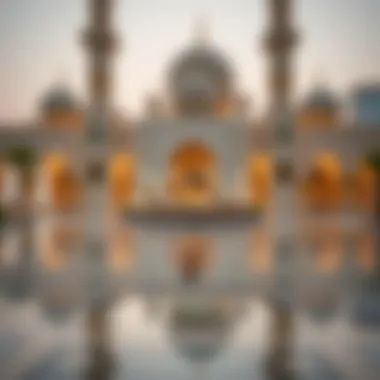UAE Calendar 2024: Key Holidays and Insights


Intro
Navigating the ever-evolving landscape of the UAE can be daunting, particularly when it comes to understanding the calendar of holidays, public observances, and cultural events. For residents, expats, and especially investors looking to make headway in the competitive real estate market, being mindful of the annual calendar is more than a mere formality. It’s a compass guiding you through opportunities, challenges, and festive occasions that shape community interaction.
As we step into 2024, this guide serves as both a roadmap and a resource, diving deep into the public holidays that mark important cultural milestones, alongside critical dates that could influence investment decisions. With a mix of high-paced urban life and centuries-old traditions, comprehending how these elements intertwine will greatly enhance your living experience in the UAE.
Planning becomes key: from coordinating your work schedule around holidays to seizing unique investment opportunities during bustling festivals. As a significant year approaches, let this guide shed light on each holiday's import and its ripple effects in various domains of daily life, especially for those with a stake in property investments.
By aligning your personal and professional timelines with local festivities, you can position yourself strategically, whether it’s for purchasing a property, starting a business, or simply enjoying a developed lifestyle in this vibrant region. Armed with knowledge, your journey through the UAE in 2024 could be both rewarding and culturally enriching.
Foreword to the UAE Calendar
Understanding the UAE calendar is fundamental for anyone engaged in daily life, business, and cultural observances in the region. This calendar not only informs people about dates but also reflects the diverse cultural and religious heritage of the United Arab Emirates. By grasping its structure and significance, residents, expatriates, and investors can seamlessly navigate their routines and maximize their opportunities in this unique landscape.
Understanding the Structure of the Calendar
The UAE calendar operates on a blend of the Gregorian and Hijri systems. The Gregorian calendar is widely used for most civil purposes, including business and international transactions. However, many significant religious holidays are determined by the Hijri calendar, which is lunar. This dual-structure can lead to some confusion, especially for expatriates and newcomers. For instance, while Christmas falls on December 25 every year, Islamic holidays shift annually due to the lunar cycle.
In 2024, for example, Eid al-Fitr is expected to be celebrated on April 10, while Eid al-Adha might occur around June 17—these dates depend on moon sightings and can vary slightly. Therefore, understanding when these holidays fall is crucial for planning personal and professional activities.
Relevance to Daily Life in the UAE
The calendar's significance extends beyond mere dates; it profoundly affects social and economic life. For residents and expats, understanding public holidays allows for better planning around leisure, travel, and work commitments. Importantly, businesses often adjust their operations during these times. For instance, many companies implement shortened working hours during Ramadan—a month of fasting and reflection for Muslims—which opens opportunities for social gatherings and community activities.
Moreover, these public holidays often lead to closures in schools, government offices, and many private sector workplaces. Thus, for families, understanding when these holidays fall helps organize travel plans, family visits, and leisure activities accordingly. It is also essential for investors and business professionals in the UAE, as many economic sectors experience fluctuations during holiday periods. The real estate market, for example, sees a surge in interest during cultural festivals when many locals and tourists engage in shopping and leisure activities. Being aware of the calendar can significantly shape strategic decisions in this vibrant market.
"The UAE calendar not only determines holiday dates but also influences the rhythm of life in this dynamic nation."
Public Holidays in the UAE for
When it comes to the ebb and flow of life in the UAE, public holidays play a pivotal role. For individuals, especially investors and expatriates, understanding these breaks isn’t just a matter of marking days on a calendar. It’s about planning, both personally and professionally. From real estate ventures to travel opportunities, every public holiday presents a chance to catch a breather, celebrate, and consider potential investments.
Overview of National Holidays
National holidays in the UAE reflect the country's cultural and historical landscape, offering locals and expatriates alike a sense of unity and purpose. The UAE celebrates a mix of secular and religious holidays. These days off work create a respite from the hustle and bustle of daily life, providing people time to reconnect with family, engage in community events, or plan short getaways.
Offices, shops, and public services generally close during these holidays, but many leisure activities often see a spike in participation. This increase in foot traffic can create excellent opportunities for businesses, particularly in sectors like tourism and retail. After all, everyone loves a good sale during a long weekend!
Religious Observances and Their Dates
Religious observances hold profound significance in this region, shaping not just individual lives but also influencing the broader economic landscape. In 2024, three key religious dates stand out that will result in public holidays: Eid al-Fitr, Eid al-Adha, and the Islamic New Year.
Eid al-Fitr
Eid al-Fitr marks the end of Ramadan, a month of fasting, reflection, and community engagement. This holiday signifies joy, feasts, and giving back. It’s not just a local celebration; expatriates from diverse backgrounds often partake in the festive spirit. The communal prayers and festive meals foster connections among families and neighbors.
The unique feature of Eid al-Fitr is its emphasis on charity, with many individuals making donations to help the less fortunate. For investors, the holiday can affect market dynamics, especially in sectors related to food, hospitality, and retail. Businesses typically launch exciting promotions.


Eid al-Adha
Eid al-Adha, also known as the Festival of Sacrifice, holds its own distinct significance. Commemorating the willingness of Ibrahim to sacrifice his son, this day is all about giving, reflection, and deep-seated traditions. The holiday usually involves the ritual sacrifice of an animal, a practice rich in symbolism that offers close-knit community involvement.
For the economy, Eid al-Adha can be bustling. There’s often an uptick in business activities, especially in meat and food sectors. Many take advantage of the holiday to travel, leading to crowded destinations and busy flights—another aspect that investors should keep in mind for any travel plans during this time.
Islamic New Year
The Islamic New Year is a chance for reflection and renewal. It’s less commercial than the two previous Eids but still carries importance. The date varies, usually shifting based on lunar sightings, and each year offers a fresh start. Amid the quieter observance compared to the Eids, communities often engage in prayer and gatherings to mark the occasion.
It's important to remember that the Islamic New Year’s fluidity can affect planning, especially in business. Investors should take note of how the holiday might influence work schedules or project timelines as people often prefer to take time off to celebrate.
In summary, public holidays in the UAE are not merely days off work; they play a significant role in shaping social interactions, economic trends, and investment strategies. By understanding the nuances of these special days, individuals can navigate life in the UAE with greater insight and foresight.
Key Dates in
Understanding key dates on the UAE calendar is not just a mere matter of knowing when to set your alarm clock or book a day off work. These dates often resonate deeply within the fabric of UAE society, reflecting its culture, economy, and people. For investors, knowing these significant events helps plan investments wisely. Homebuyers and expatriates can also leverage this information to better integrate into the local lifestyle.
Significant Events in the UAE
The UAE is a tapestry woven with diverse events that cater to a wide audience. Each significant event brings opportunities and changes in various spheres—be it business, social gatherings, or cultural experiences. For instance, national holidays often see a spike in travel plans, while local festivals can lead to increased consumer spending in various sectors.
Cultural and Annual Festivals
Cultural festivals are crucial in keeping the traditions alive while also promoting tourism and local economies. These celebrations provide a lens through which both residents and visitors can appreciate the UAE's rich history and vibrant society.
Dubai Shopping Festival
The Dubai Shopping Festival is an annual event that attracts retailers and bargain hunters alike. It’s not just a shopping event; it's a grand carnival of discounts, entertainment, and cultural experiences.
- Key Characteristic: The Dubai Shopping Festival runs over several weeks, featuring a blend of shopping deals, concerts, and cultural events that showcase local talent.
- Popularity: This festival is popular among tourists and locals for offering unique promotions on everything from electronics to fashion.
- Unique Feature: A standout feature of this festival is the grand raffle, which gives people a chance to win life-changing prizes. The thrill of potentially winning a luxury car or an extravagant vacation adds to the excitement.
- Advantages: For investors, particularly in retail, the surge in consumer spending during this period can translate into higher revenues and brand visibility in a competitive market.
Sharjah Heritage Days
Sharjah Heritage Days brings a whole different flavor to the cultural calendar by focusing on preserving and celebrating Emirati heritage. This festival highlights traditional crafts, cuisine, and performances.
- Key Characteristic: Unlike commercial festivals, Sharjah Heritage Days emphasizes education and community engagement through interactive workshops and exhibits.
- Popularity: While this event attracts a dedicated audience, it's also an opportunity for expatriates and tourists to dive into UAE culture deeply.
- Unique Feature: The festival showcases local artisans, who demonstrate traditional skills, giving attendees a hands-on experience with Emirati culture.
- Advantages: For those in the real estate market, engaging with cultural events like these can foster relationships with local communities and build goodwill, essential for long-term success.
With such vibrant festivities and significant events lined up in 2024, the UAE offers myriad opportunities for individuals and investors alike. Keeping track of these key dates can aid in effective planning and understanding of local culture, making it easier to navigate life and business in the UAE.
Impact of Holidays on the Real Estate Market
The impact of holidays on the real estate market in the UAE is an area that commands attention, especially for investors and homebuyers looking to navigate this dynamic landscape. Public holidays create unique opportunities and challenges, affecting everything from buyer behavior to property values. Understanding how these holidays influence market trends is vital for any stakeholder in the real estate sector.
Market Trends During Holiday Seasons
The real estate market often sees fluctuations during holiday seasons in the UAE. For instance, during Eid al-Fitr, there is typically an uptick in demand for properties. Families often look to make moves just after the fasting month, and many expatriates return home or relocate. This holiday can act as a catalyst, encouraging buyers to finalize deals they’ve been contemplating. Furthermore, the festive atmosphere tends to spark excitement around property listings, creating a sense of urgency among potential buyers.


Additionally, the tourism sector heavily influences these trends. With holidays attracting both residents and tourists, the market experiences heightened activity.
- Increased Foot Traffic: During holiday periods, open houses can see doubled or tripled attendance. The influx of visitors allows sellers to showcase their properties under favorable conditions.
- Price Variability: Property prices may exhibit reasonable volatility. Sellers may capitalize on the festive mood, sometimes pricing their properties higher due to increased interest.
- Market Adaptation: Smart investors adjust their strategies around holidays, recognizing they can benefit from timing their listings with peak visitor seasons.
Investment Opportunities Around Public Holidays
Investment opportunities often abound around public holidays, making it essential for investors to remain vigilant and proactive. One common practice is the enhancement of properties to align with seasonal trends. Properties strategically marketed during significant holidays tend to resonate better with buyers. For example, homes featuring traditional decorations during Eid can attract cultural buyers looking for a touch of familiarity.
Moreover, developers can take advantage of public holidays by launching projects or promotional offers that cater to the festive spirit. This includes:
- Special Offers: Developers may provide limited-time discounts or financial incentives, capturing the heightened interest.
- Themed Events: Organizing holiday-themed community events can spur interest in new properties, creating a buzz that can lead to quick sales.
- Collaborations with Local Businesses: Partnering with local retailers or restaurateurs can provide unique packages that enhance visibility and draw in potential buyers.
"Understanding the pulse of the market during holidays can be the difference between a missed opportunity and a successful investment."
Travel and Tourism Considerations
Travel and tourism play a crucial role in the socio-economic landscape of the UAE. The interplay between public holidays and tourism can lead to a dynamic surge in travel activities, both from within the country and from international visitors. Such holiday periods are not just times for relaxation but also pivotal moments for businesses, particularly in the hospitality and retail sectors.
Increased Tourist Activity
As decision-makers and families plan their holidays, the UAE’s calendar is peppered with national and religious observances that often translate into an uptick in tourist activities. When public holidays roll around, cities like Dubai and Abu Dhabi become bustling hubs brimming with visitors. Tourists flock to iconic landmarks like the Burj Khalifa or the Louvre Abu Dhabi, significantly boosting local businesses and services.
Why Does This Matter?
- Economic Impact: A surge in tourists can mean heightened revenues for hotels, restaurants, and recreational activities.
- Cultural Exchange: With diverse visitors, there's a melting pot of cultures, leading to enriching experiences for locals and tourists alike.
- Event Participation: Many cultural events align with holidays, such as the Dubai Shopping Festival, drawing in crowds eager for both entertainment and shopping.
For those looking to attract international tourists during these peak periods, understanding the pattern of holiday seasons becomes vital. Not just for convenience, but as a strategic avenue to maximize profits.
Travel Planning for Residents and Visitors
For both residents and visitors, planning around holidays requires foresight and preparation. The busy periods that often accompany these holidays can lead to potential travel challenges, such as overcrowded transport systems and fully booked accommodations. Thus, it’s advisable to keep in mind several considerations:
- Book in Advance: Flights and hotels can fill up quickly. Early reservations can save money and ensure desired locations.
- Local Insights: Residents should share tips on navigating popular areas during peak times, such as avoiding traffic or knowing the best times to visit attractions.
- Cultural Sensitivity: Visitors should be aware of local customs, especially during religious holidays, to enhance their experience and show respect for traditions.
"Understanding the pulse of the UAE's holiday calendar helps individuals navigate the travel landscape effortlessly, making for a more enjoyable experience for all."
Cultural Significance of UAE Holidays
Understanding the cultural significance of holidays in the UAE unveils layers of tradition, faith, and community spirit that bind the nation together. These observances reflect not only the religious duties of the populace but also serve to cultivate national unity among the diverse tapestry of cultures throughout the Emirates. The days of celebration and reflection offer residents and visitors alike a chance to connect more deeply with the Emirati way of life, fostering relationships that extend beyond mere acquaintanceship.
Religious Observance Practices
Holidays in the UAE are deeply entrenched in Islamic traditions, underscoring the importance of faith in everyday life. Take, for instance, Eid al-Fitr, which marks the end of Ramadan. It's a vibrant period where families gather for meals, often sharing dishes that have been passed down through generations. The communal prayers at mosques serve not just a spiritual purpose but also reinforce social bonds.
During Eid al-Adha, the practice of Qurbani, or animal sacrifice, takes place, symbolizing obedience to God and the willingness to give. Homes are filled with the sounds of laughter and joy as communities come together to donate meat to those in need. This act of charity reflects Islamic values and cultivates a sense of responsibility towards one another.
Beyond Islamic holidays, other religious observances also hold significance. The Islamic New Year, observed with a spirit of reflection, is an occasion where people recall the significance of past years while hoping for prosperity in the future.


All these observances remind us that they are not just days off; they are pillars of cultural identity, instilling pride and purpose within the community.
National Pride and Celebrations
The UAE holidays are also a celebration of national pride. Take National Day, celebrated on December 2nd, which marks the formation of the UAE in 1971. The streets are awash with flags and celebrations, showcasing the love the citizens have for their country. This day is not only a tribute to the leaders who shaped the nation but also a recognition of the achievements that have propelled the UAE onto the international stage.
Festivities often include spectacular fireworks, parades featuring traditional attire, and cultural performances that evoke a sense of unity. Emiratis and expatriates alike come together, showcasing the multicultural nature of the country, reminding everyone of the rich heritage that contributes to the emirate's unique character.
In summary, the cultural significance of UAE holidays transcends mere time off work; they are about building connections to faith, tradition, and national pride. Each holiday embodies lessons of generosity, community, and identity, enriching the social fabric of the Emirates while providing investors and homebuyers insight into the cultural rhythms of life in the UAE. Those who engage in these celebrations often find themselves woven into the very heart of Emirati society.
Public Sector Operations During Holidays
Understanding how public sector operations unfold during holidays is vital for both residents and businesses in the UAE. Public services not only cater to the needs of its citizens but also impact economic activities significantly. When holidays arrive, it’s essential for individuals to stay informed about how these operations adjust, as this information can help in planning personal and business activities efficiently.
Government Office Schedules
Public sector offices in the UAE typically follow a set schedule during holidays, though it slightly varies, taking into account the occasion. For national holidays, offices might close for extended periods, often ranging from a few days to a week, while religious holidays can result in a shorter closure. Oftentimes, government bodies like the Ministry of Human Resources and Emiratisation issue notifications detailing these schedules a few weeks in advance. This ensures everyone is in the loop and can plan accordingly.
In 2024, for example, major holidays such as Eid al-Fitr and UAE National Day see a complete shutdown of government entities, allowing employees to partake in celebrations with family.
Consider the following points regarding government office schedules during holidays:
- Public Notification: It’s common for announcements to be posted on official government websites or social media channels, allowing citizens easy access to this crucial information.
- Variability by Emirate: Each emirate may have distinct practices regarding public sector closures, so being aware of local announcements is advisable.
Impact on Public Services
The operational shifts in public services during holidays can influence various sectors, from health services to public transportation. These changes can lead to both benefits and challenges. For instance, hospitals might arrange special schedules or provide emergency services. Meanwhile, public transport may operate on reduced hours but often ramps up capacity beforehand to cater for increased demand.
The impact of holiday schedules on public services can be summarized as follows:
- Service Limitations: Certain services might be limited or unavailable, necessitating planning ahead for both residents and expatriates.
- Increased Demand for Emergency Services: As more people take to the streets during festive periods, an uptick in emergency service calls is plausible, stressing the importance of efficient staffing during these times.
- Promotion of Local Events: The UAE government often uses holiday periods to promote local cultural and entertainment events, encouraging participation and enhancing community spirit among citizens and expatriates alike.
"Holidays can open the gates to not just relaxation, but also to service adjustments that may affect daily activities, understanding these dynamics will help in navigating them smoothly."
Information can be sought from resources such as the official UAE government portal or local news outlets for precise updates on services during holiday times, ensuring that individuals are not left in the dark.
The interaction between public sector operations and holidays is a fundamental aspect that influences the quality of life and overall satisfaction in the UAE. Recognizing how these dynamics work gears everyone towards a more organized and welcoming holiday season.
Culmination
In wrapping up the examination of the UAE calendar for 2024, it becomes abundantly clear that understanding these timelines is not just a matter of keeping track of days, but a significant element that shapes the very fabric of life in the Emirates. The calendar serves as a tool for both personal and professional planning, guiding individuals and businesses through the ebb and flow of holidays and observances throughout the year.
Final Insights on the Calendar
The public holidays, cultural events, and religious observances one encounters are reflections of the broader societal values and traditions held dear in the UAE. For investors and homebuyers, this knowledge is precious. Planning around these periods can lead to optimal engagement opportunities. The bustling atmospheres during holidays often spark increased demand in the real estate sector, as families look for new homes or seek investment properties that cater to seasonal tourism.
Moreover, expatriates can leverage this information to navigate their social lives and professional responsibilities more effectively. Knowing when schools are closed, or public services may slow down, allows for better planning of travel or family gatherings.
To summarize, tapping into the UAE calendar for 2024 opens a well of opportunities, insights, and practical knowledge that enhance life in the UAE, both personally and professionally. Keeping an eye on the rhythm of the calendar can provide significant advantages in understanding when to invest, celebrate, and connect with the vibrant culture of the region.
"Planning is bringing the future into the present so that you can do something about it now." - Alan Lakein
Take these insights, and may they serve you well as you navigate through the months ahead in this dynamic region.







